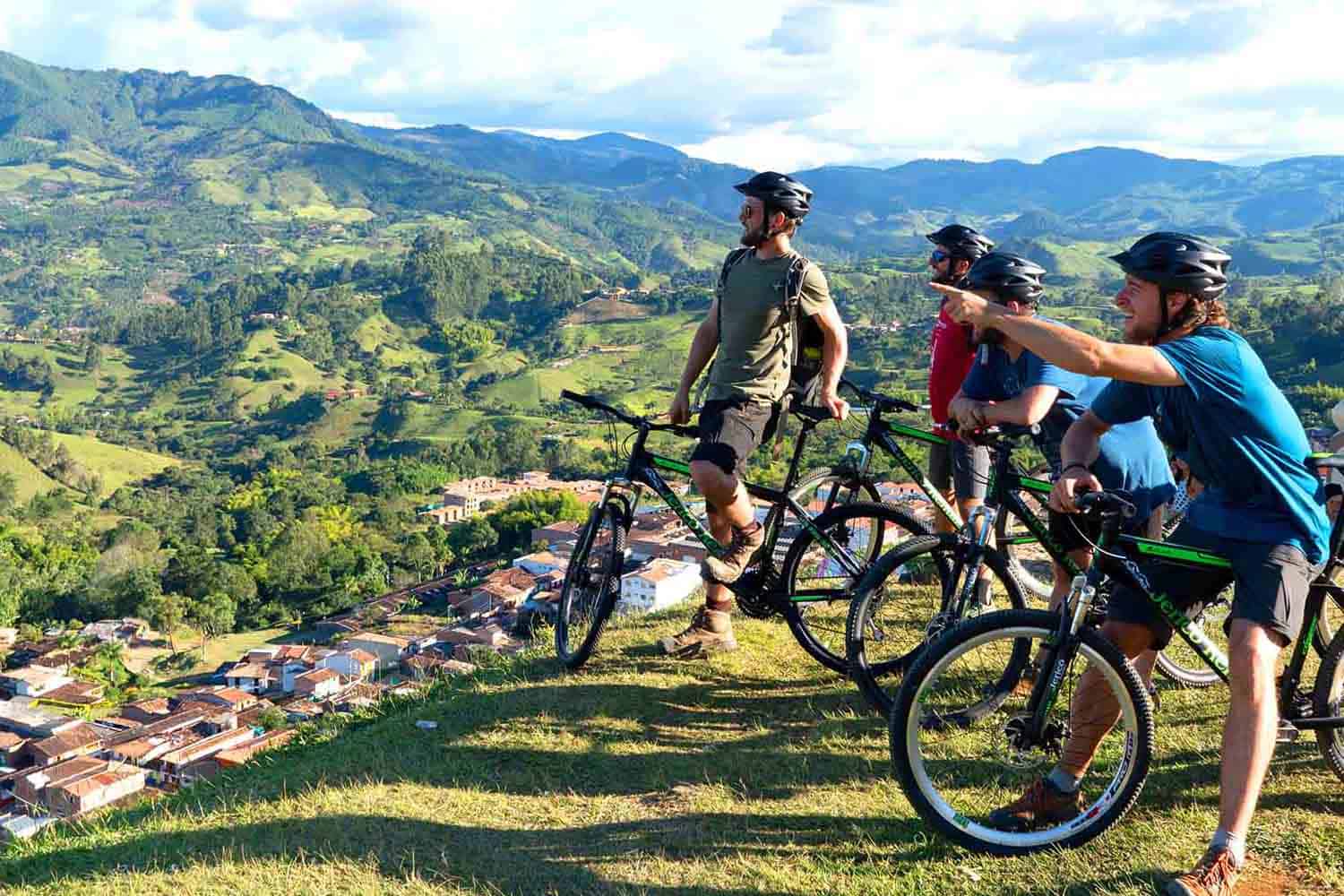Con la llegada de la 4ta revolución industrial, y con los últimos acontecimientos de la pandemia mundial, ya muchos nos hemos tenido que acostumbrar al trabajo remoto (trabajar desde casa a través de una pantalla). ¿Qué tal si pudieras aprovechar esta nueva situación para cumplir con tu sueño de viajar por el mundo? Pues no te preocupes, nosotros te ayudamos un poco. En nuestra guía encontrarás cómo volverte nómada digital y viajar sin límites mientras ¡trabajas virtualmente!
Seguir desarrollando tu profesión mientras viajas es un sueño que está cada día más a la mano, gracias a la accesibilidad que nos permite tener internet en todas partes y demás de eso la diseminación a nivel mundial de nuevos espacios de trabajo como por ejemplo los nuevos coworking.
Puedes viajar, conocer nuevos lugares y enriquecer tu vida personal y profesional, en otra situación años atrás estarías, sentado en una oficina compartiendo todos tus días con los mismos colegas y jefes. Ahora el mundo se abre a tus bies y tienes un sin número de alternativas en donde podrás conocer nuevas personas, nuevas culturas y estilos de vida siendo un nómada digital.
1. El lugar
Cuando empieces tu aventura como Nómada Digital la decisión más importante siempre será, a dónde puedes a viajar y disfrutar mientras puedes trabajar remotamente.
Acá te dejamos algunas consideraciones para que elijas la ubicación:
¿En el lugar hay Comunidad?
Trabajar remotamente puede generar soledad. Estamos sentados en frente de una pantalla durante 8 horas al día, normalmente en una oficina estarías en reuniones y hablando con compañeros de trabajo, y en la mayoría de los casos, son personas que no tienen mucho en común contigo.
Encontrar en un viaje a una comunidad con la que te identifiques y compartas el mismo estilo de vida te pueden brindar amistades e incluso colaboraciones profesionales muy fluidas, reales y sanas para ti.
Todos los que hemos trabajado desde casa sabemos que puede ser difícil motivarse para trabajar disciplinadamente durante las horas requeridas y cumplir con todos los objetivos laborales. En cambio, estando en un lugar nuevo, lleno de cosas por descubrir, puedes trabajar mucho más motivado para cumplir con tus metas laborales. Se trata de mantener el equilibrio entre el trabajo y la diversión.
2. La Calidad del internet
Para poder seguir trabajando desde tu nuevo lugar de viaje, es fundamental la calidad del internet. No podemos arriesgarnos con una red inestable mientras estás haciendo una presentación a los socios de tu empresa o a cualquier persona o grupo de tu organización.
Antes de viajar, asegúrate de la velocidad del internet en el lugar donde piensas hospedarte o el coworking ubicado en la cuidad de destino. Muy importante además que en dicho lugar haya un backup en caso tal que la red principal falle. Además pregunta si el internet está disponible en los horarios que lo necesitas.
3. Espacio de trabajo
En los lugares de trabajo tradicionales, como en las oficinas, los empleadores tienen la obligación de asegurar un espacio de trabajo ergonómico, ventilado y tranquilo. Como nómada digital, a veces es difícil asegurar que dicho espacio cumpla con estas características. Tanto para su salud como para tu productividad es de suma importancia que el espacio donde trabajes tenga sillas adecuadas, la luz correcta, una buena ventilación, sin ruido o cualquier tipo de contaminación auditiva y si adicional pueden encontrar un espacio con una vista hermosa, te aseguro un nivel de productividad sin límites.
4. Tiempo libre
Tener disciplina es uno de los factores más importantes para ser un nómada digital exitoso. Pero la disciplina no significa trabajar 14 horas al día; hay que encontrar una rutina óptima que te brinde un equilibrio entre el trabajo, el descanso y el ocio, lo cual aumenta tu productividad.
Por consiguiente, trabajar desde un sitio en donde tienes acceso a una variedad de actividades para divertirte en tu tiempo libre, es primordial. Dependiendo de tus intereses, pregúntate: ¿Puedes ir a trotar en la mañana antes del trabajo? preferiblemente en un lugar donde puedas respirar aire puro, con buen clima, y además, seguro.
En momentos de ocio, ¿hay personas a tu alrededor con quienes puedas compartir, un café, tomar una cerveza en la noche cuando hayas terminado de trabajar? ¿Tienes acceso a zonas verdes? ¿Hay actividades culturales en donde puedas participar los fines de semana? ¿Encuentras gastronomía local en la zona? Hay excursiones interesantes para hacer?
Si apenas estás empezando tu nuevo estilo de vida como nómada digital, te recomendamos empezar en un lugar relativamente cerca de tu hogar para evitar trámites y papeleo con visas, cambios de la zona horaria, un idioma extraño, altos costos de viaje, etc. Así podrás medir un poco tu aceptación e interacción con lugares diferentes a una oficina para realizar tu trabajo.
Luego, cuando tengas la tranquilidad de que puedes manejar tu estilo de vida de nómada digital, asegúrate de no planificar viajes con agendas apretadas y atropelladas, llenas de actividades cronometradas. Es indispensable planear estadías más tranquilas, en donde puedas aprovechar el entorno, establecer una rutina y crear vínculos con una comunidad nómada y local.
No olvides que es fundamental separar el trabajo del ocio y la diversión. Apaga las notificaciones de trabajo en tus tiempos libres y genera un espacio tranquilo para tu descanso, sin distracciones.
5. Tu alimentación
La nutrición juega un rol importante en la salud y en la capacidad tu cerebro. Usualmente los nómadas digitales, pertenecen a industrías en donde su principal fuente de ingresos es el conocimiento. Por esto, el cerebro y tu mente, se convierten en la herramienta fundamental de nuestra economía, por lo que, es de suma importancia cuidar tu salud.
Los nutrientes más importantes para el cerebro incluyen:
- Ácido graso Omega 3: Linaza, pescado, fresas, brócoli.
- Magnesio: hojas verdes como la espinaca, nueces, semillas, frutos secos y granos integrales.
- Calcio: Lácteos, almendras, ajonjolí, frijoles, brócoli.
- Fibra: Granos integrales, bananos, avena, legumbres.
Además de la comida, la hidratación juega un rol muy importante en el funcionamiento del cerebro. El cuerpo requiere agua para hidratar la sangre, los tejidos y los pulmones. No tener suficiente hidratación puede causar problemas para la memoria y la atención. El cerebro funciona mejor cuando está hidratado, generando más rapidez, claridad y creatividad en tus procesos cognitivos. La cantidad de agua que debes tomar, depende de tu peso, actividad física y entorno, pero unos 3 litros al día es un buen punto de referencia.


